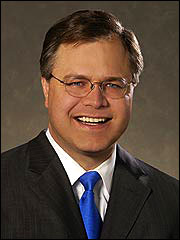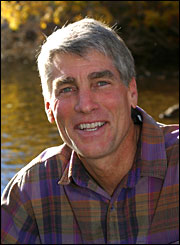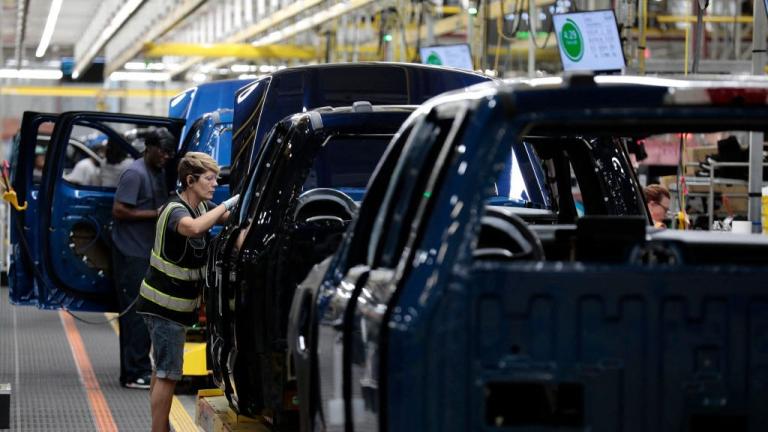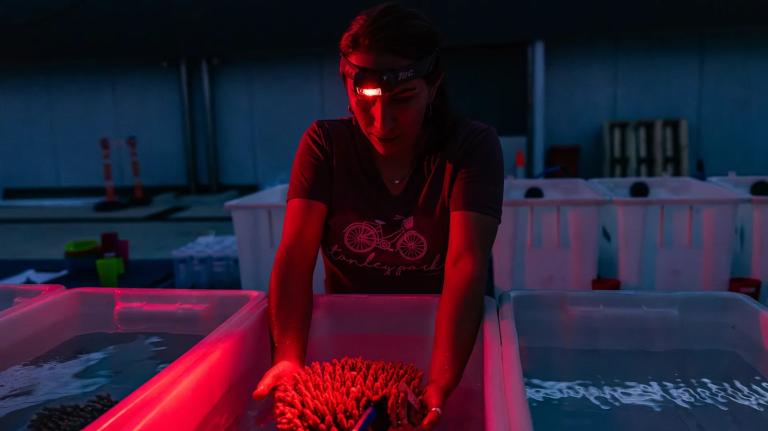One of the most lively debates over energy and environmental policy is taking place in Colorado’s Senate race this year, where Rep. Mark Udall (D) and former Rep. Bob Schaffer (R) are duking it out in the race to replace retiring U.S. Sen. Wayne Allard (R).

Schaffer represented Colorado’s 4th Congressional District from 1997 through 2003, where he was a thorn in the side of enviros. He received just a 5 percent lifetime score from the League of Conservation Voters, which named him to its “Dirty Dozen” list this year. His tenure in the House included numerous votes against increasing fuel-economy standards for automobiles, increasing funding for energy efficiency and conservation programs, and protecting water resources from mining pollution.
Since leaving the House in 2003, Schaffer has served as vice president for business development at Aspect Energy, LLC, an oil and natural gas exploration and investment company. In this election cycle, Schaffer has pulled in $151,550 in donations from the oil and gas industry, prompting critics to peg him “Big Oil Bob.”

His opponent, Mark Udall, is the son of late Arizona Congressman Morris “Mo” Udall, who was a strong voice for environmental concerns in the House for 30 years. Mark Udall has in many ways carried on that family legacy in his 10 years in the House representing Colorado’s 2nd District. He has served as co-chair of the Renewable Energy and Energy Efficiency Caucus, and recently pushed legislation that would require utilities to produce a percentage of their electricity from renewable sources. He has also sponsored a number of bills on open space, wilderness preservation, and public lands. His record on these issues won him an LCV endorsement this year.
While Udall has historically opposed measures to increase drilling, this summer he followed Barack Obama’s lead and shifted his position, saying he supported a bipartisan compromise on energy that would open up more areas to drilling as well as increase investment in renewables. An early Udall ad in this year’s race focused solely on clean, renewable energy and green jobs, featuring the candidate standing in front of a field of wind turbines, but a more recent ad includes a call for more domestic drilling. This change in position prompted Schaffer to label him “U-turn Udall.”
Attempts to set up an interview with Schaffer were not successful, but Grist did catch up with Udall for an email interview about the race in Colorado, his plans for the Senate, and his famous family.
—–
Grist: You watched the Senate debate on climate legislation from the outside this year. If you’re a part of the Senate next year, what would you bring to the debate?
Udall: The debate on climate change is linked to energy policy. I’ve made that case in the House and will do so in the Senate. We must develop a national strategy to confront the environmental challenges posed by global climate change, including policies that reduce our dependence on foreign oil and other fossil fuels, initiate a national program of energy efficiency, step up efforts to capture and store carbon, and invest in enhanced scientific understanding of the climate system. In the House, I’ve authored legislation that tackles carbon sequestration and climate-change research. I’ll do the same as Colorado’s next senator.
Grist: Back home in Colorado, in 2004, you worked with the Republican speaker of the House to encourage the state’s voters to approve one of the nation’s first renewable portfolio standards, which requires utilities to produce an increasing percentage of their electricity from renewable sources. What possibilities do you see for working on issues like this in a bipartisan fashion in the Senate?
Udall: Republicans and Democrats must work together to solve our energy crisis. I’ve authored a comprehensive [energy] bill that is based on a bipartisan approach, and I have reached out to moderate Republican House members to join me. We need to throw the kitchen sink at this energy issue to create solutions for our country. I believe my proven ability to reach across the aisle, work with Republicans, and build stronger alliances to advocate for renewable energy sources and a comprehensive energy program will be an asset in the Senate. One of the many things I plan to push for [is] a federal renewable electricity standard that would require that 20 percent of our electricity come from renewable energy sources by 2020.
Grist: Your opponent argues that your resistance to practices like extracting oil from Rocky Mountain shale has contributed to rising energy costs. What’s your counterargument? What do you tell voters who are upset about the rise in energy costs?
Udall: This is one of many inaccurate claims my opponent has leveled against me. For the record, I support the ongoing research and development program on oil shale. But I oppose moving forward with a full-scale commercial leasing program until we are sure we have the water resources and technology to assure commercial viability for responsible development of this resource. Even the companies most involved with development of oil shale, including Chevron and Shell, say that oil shale for commercial use is decades off. Chevron officials have been quoted saying that they believe we should pursue oil-shale development at a measured pace. I agree, and believe that the emphasis at this point should be on research and development, and not on a rush to develop federal leasing regulations. It concerns me that Bob Schaffer would continue to push something that puts Western Slope water and the economy at risk.
Grist: What would be the basic outline of an ideal energy plan for the country? Where would the emphasis be placed?
Udall: I have authored a comprehensive energy plan in the House. My energy plan is similar to the so-called “Gang of 16” proposal suggested by a bipartisan group of senators. [Editor’s note: The “gang” grew to 20 before its proposal was pulled from the table.] This plan will roll back unnecessary tax breaks for oil and gas companies and invest in sustainable, renewable energy technology.
A “moon shot” forward with renewable energy should be our future, and it is the best way to rid our economy of dependence on foreign oil and relieve the high costs of energy. In addition to this leap toward renewable energy, I believe we can also add responsible offshore drilling. But as T. Boone Pickens points out so well, drilling for more oil is not going to solve our fundamental problem. That’s why my plan calls for renewable energy production goals that must be met.
Grist: You’ve been a proponent of carbon sequestration. What do you think are the possibilities — and perhaps some of the perils — of using coal for energy going forward?
Udall: The “Gang of 16” proposal includes coal-to-liquid research and development. There is a lot of potential in Western coal, and I think we should support research and development of the resource as part of a broad and comprehensive energy policy. One of the main challenges with coal are carbon emissions, which have been proven to contribute to global climate change. I introduced legislation which will create public-private partnerships to further the development and demonstration of carbon-capture-and-storage technologies. [The legislation passed the House as part of the 2007 energy bill, but didn’t pass the Senate.] Carbon-sequestration technology will help us better develop this domestic resource.
Grist: Polls show that your race is close. What sort of role do you think environmental issues will play in setting you and your opponent apart?
Udall: Colorado is a state where there are more independents than Republicans or Democrats, so we always expected a close race. I believe environmental issues are one of the reasons we will win this race. Bob Schaffer is an oil and gas executive. The oil industry is largely funding his campaign. There’s nothing wrong with being an oil and gas executive — I have many friends in this industry — but I don’t believe Bob’s views on energy policy have ever much wavered from the “drill only” approach we’ve seen from the Bush-Cheney administration.
Grist: What environmental accomplishment at home in Colorado are you most proud of?
Udall: Passing the James Peak Wilderness Act, which broke a near decade-long impasse and now provides protection for 40,000 acres of public lands. I am particularly proud of this legislation because it involved careful negotiations and discussion with a wide range of competing interests including county government, conservationists, water developers, and recreation users. Getting this bill done involved listening and working across partisan divides. Thanks in large part to the good working relationship I forged with Republican Congressman Scott McInnis, we were able to get my bill through a Republican-controlled Congress and signed into law by President Bush.
Grist: How about on a national scale?
Udall: This past year, I worked to pass the renewable electricity standard in the House of Representatives. The amendment called for electric utilities to invest in renewable energy sources by 2020 and for the companies to make 15 percent of their electricity from wind, solar, and other renewable energy sources. The amendment also included provisions to encourage utility companies to increase their energy efficiency. This legislation represents a big step toward breaking the energy crisis. Unfortunately, it was blocked in the Senate.
The amendment’s failure in the Senate underscores why we need change in our government and why I am running for the Senate. I am proud that my leadership helped get this important amendment out of the House and I am hopeful that we will have another opportunity to secure passage as the Congress debates comprehensive energy legislation. I’m going to keep up the fight on this.
Grist: Your cousin, U.S. Rep. Tom Udall, is also running for Senate, in New Mexico. He’s got a strong interest in environmental issues as well. Do you foresee Udall-Udall partnerships on environmental legislation? What sort of issues might you work on together?
Udall: Absolutely. Tom and I have partnered on legislation before, including legislation that promotes better wildfire management on our public lands. Unlike me, Tom is a lawyer who has extensive experience as the attorney general of New Mexico. I look to his wisdom and counsel on many issues, including privacy rights and judicial matters.
Grist: Your father, Morris Udall, was well-known for his work on conservation as an Arizona congressman. What lessons did you take from him on these issues?
Udall: My dad was a problem solver. He was able to work with anyone and had a famous relationship with Sen. Barry Goldwater. He also was a deeply ethical man who placed a high priority on values like honor, integrity, and generosity. More than anything, he had his feet on the ground and never took himself too seriously — his sense of humor was legendary. I hope I inherited a bit of his best qualities. I believe my ability to work with all kinds of people can be linked back to my father’s example.
Grist: Sen. Gordon Smith of Oregon is a second cousin of yours. His record on environmental issues is more mixed, though he’s promoting his efforts to raise fuel-economy standards as he runs for reelection. Even though he’s a Republican, are you rooting for him?
Udall: Gordon is a great cousin. If he is reelected, he is one of many Republicans I intend to work with in the Senate. The fact that we are related is certainly a plus.
Grist: Given your roots in Arizona, you’ve long been friends with John McCain, and he had a close relationship with your father. What do you think of the energy and climate policies he’s rolled out this year? Are you supporting him?
Udall: Sen. McCain has been a great friend to me and my family. I’ve always been grateful for the time he spent with my father when he was dying, and for the acknowledgment he’s always made about my father’s mentorship when John was first elected to Congress. I have appreciated Sen. McCain’s work on climate change and protecting [the Arctic National Wildlife Refuge]. I am heartened that at least on these issues Sen. McCain and Sen. Obama seem to be in agreement.
Sen. McCain’s energy plan is missing a national renewable electricity standard — a policy that has been proven in Colorado to not only spark progress in renewable energy but also to create jobs. With regard to climate change, I support Sen. McCain’s support of implementing a cap-and-trade system. However, again, I do not believe that John McCain’s plan goes far enough. I believe we must shoot to [cut emissions] 70 percent of 1990 levels by 2050.
Grist: Who is your environmental hero?
Udall: My father, Morris Udall.
Grist: What have you done personally to reduce your energy and environmental footprint?
Udall: Our family has worked to reduce our “carbon footprint” in a variety of ways. We equipped our home with solar panels; we also traded in a gas-guzzler for a fuel-efficient car. We’ve taught our kids to turn off lights, we use low-energy light bulbs, and I am attempting to run a carbon-neutral campaign.
Grist: How do you get to work every day?
Udall: In Washington, D.C., I walk to work as often as I can. In Colorado, I drive a Prius.
Other 2008 Grist Candidate Interviews
- Alaska Senate candidate Mark Begich (D)
- Kansas Senate candidate Jim Slattery (D)
- Maine Senate candidate Tom Allen (D)
- Nebraska Senate candidate Scott Kleeb (D)
- New Hampshire Senate candidate Jeanne Shaheen (D)
- Oklahoma Senate candidate Andrew Rice (D)
- Oregon Senate candidate Jeff Merkley (D)
- Virginia Senate candidate Mark Warner (D)
In all cases, Grist made efforts to interview these candidates’ opponents.


